10 August 2018
|
Author Sammy Stein chats to Wendy Kirkland, the UK pianist whose steady rise to fame has been recognised by many.
Wendy Kirkland is a UK pianist whose rise to fame has been steady. After 15 years of being a working musician, her recent recognition by some of the biggest names in performing has perhaps come as no surprise to those following her.
This is a pianist whose playing has been described by the Sunday Times as, ‘mellow and stylish’. Her CD ‘Piano Divas’ is dedicated to women who play piano and sing and has proved a huge hit since its release in 2017 with positive reviews in major newspapers. A UK tour is well underway and continues until December with a few festival appearances too. She truly is a pianist making waves.
‘I’ll do something different’
On her earliest influences, Wendy says, ‘I was inspired by my Dad, teachers and several people including my Mum as she was always singing melodies she heard on the radio or from her childhood, from Purcell to Mama Cass to Sade. I used to watch Dad play the organ and piano in local clubs to supplement his income as a draughtsman. Somewhere, there is a photograph of me aged 2 sitting at a piano plonking away like I knew what I was doing. I was always playing songs I heard on the radio. In the school choir, I would sing harmonies even though the others gave me odd looks but I thought, “what’s the point of everyone singing the same note? I’ll do something different.”’
‘I used to listen to my Dad’s LP collections, one of which was Eric Robinson’s ‘World of Music’ – a collection of classical music from different countries. My favourites varied but I remember the ‘Merrie England’ LP with Walton, Grainger, Binge and Elgar; the ‘Scandinavian’ LP with Sinding, Bull, Grieg and Alfven; the ‘Spanish’ LP with Chabrier, Granados and Albeniz. I also loved Chopin – Dad’s Tamás Vásáry album got some hammer from me on the stereo (but then so did the Neil Sedaka album he’d bought after Neil started touring the UK’s clubs). I suppose I always went for melody, and something I have always been able to do is play a melody by ear.’
A journey full of turns
Whilst the piano is now Wendy’s main instrument, the journey took a few turns, as she explains, ‘We were encouraged to sing and play the recorder at Old Hall Junior School in Chesterfield, (UK). The headteacher was ambitious and musical and he arranged Papageno’s ‘Aria’ from Mozart’s ‘Magic Flute’ for the recorder group. I played descant and treble whilst he played the part of Papageno on sopranino. A bit later on, my Dad met members of the Syd Lawrence orchestra whilst performing at a function, and I was presented with a clarinet which I loved and still play on occasion. I also remember going to see Welsh flautist and children’s concert presenter Atarah Ben-Tovim with my Mum and sister. She involved the children – one of whom was me. This inspired me to play more, although not the flute. Then I went to see percussionist James Blades and he let me hit the timpani (I got myself invited onto the stage twice!) but I was not inspired to be a percussionist either.’
‘There was something about the piano which always entranced me. Even now, I get a strange frisson when I watch other excellent pianists play the piano; something about the tactile nature of the keys, how they press down, how the hands move fluidly over the keyboard. It’s mesmerising. Soon after the James Blades concert, my mum paid for my sister and I to have piano lessons out of the family allowance.’
Her healthy obsession with jazz
At just 10 years old, Wendy got a scholarship for piano from Derbyshire Music. She told me, ‘My piano teacher heard about the opportunity and my sister and I went for it. I was awarded the scholarship. It meant all my lessons were paid for, which was a good thing as my sister and I moved to another teacher after grade 5 who was more expensive than our first one.’
It was as a teenager that Wendy decided to concentrate on jazz piano. She explains, ‘I’d always enjoyed listening to Nat King Cole, Ella Fitzgerald, Frank Sinatra and Sarah Vaughan. I don’t suppose I thought of it as jazz. Dad had an album by British pianist and composer Roger Webb, playing Gershwin with his piano trio which I loved and when I was around 16, he acquired a load of sheet music from a retiring piano teacher. One of these was a transcription of ‘Time Out’ and ‘Time Further Out’ by The Dave Brubeck Quartet. I’d bought the simplified piano sheet music of ‘Take Five’ and been playing it obsessively (as well as ‘Carrillon’ by Sky). I sat and sight-read Dave Brubeck’s solos on ‘Kathy’s Waltz’ and ‘Three to Get Ready’. These pieces left me wondering how Dave Brubeck could come up with these improvised melodies and chord voicings that sounded so interesting, lush and sophisticated. My piano teacher knew little of jazz when I asked but made sure I got Ravel’s ‘le Tombeau de Couperin’ as a substitute! I’d seen one of the pianists on Young Musician of the Year play the ‘Forlane’ from this suite and fallen in love with it.’
On the links between jazz and classical piano playing styles, Wendy says, ‘For me, music is music. I don’t like pigeonholes in general, perhaps because I don’t fit in one but I think nobody really does. To me, pigeonholing is for the unimaginative. If you read Brazilian pianist Eliane Elias’ biography, nowhere does it say she studied jazz as a speciality – she studied music. Though she’s known more for her jazz work she has made classical albums too. I wonder if some pianists who have been trained classically, get used to the routine of reading a piece which has to be interpreted a certain way, within strict boundaries, then internalised, practiced and then performed with little room for personal expression might find it more difficult to improvise or loosen up.'
'Similarly, I know jazz pianists who have no problems improvising but other aspects of their playing, such as reading music, or good hand techniques, are lacking. My ideal scenario would be to take the classical discipline, reading and technique then apply the jazz sensibility of expression, improvisation and soul to the music. I think there is a little too much emphasis on perfect technique in both classical and jazz performance these days, at the expense of the feeling and soul. Some of it leaves me cold.’

Playing with the greats
I asked Wendy how it felt to play with some of the greats of jazz and to be recognised by her peers as a pianist who is truly coming into her own? She told me, ‘I’ve worked with Jim Mullen and Alan Barnes, initially through Chesterfield Jazz Club when we invited Jim to come and join us,’ (‘us’ being her band, consisting of her on piano, Pat Sprakes on guitar and Clive Loveday on drums).
‘Jim is so supportive as well as being a phenomenal guitarist. He later offered his support by way of a quotation which was in our promotions. Saxophonist Alan Barnes has also offered his support in the same way. Alan is the archetypal jazz hero. He gets everywhere and collaborates with many people on so many different projects. Both Jim and Alan are at the very top of their game.’
The importance of her husband
Wendy mentioned another important component of her band and music and that is Pat Sprakes, her husband. I asked her how they met and what working together was like. She told me, ‘I was offered a gig in Derby and was working with a guitarist at the time, who couldn’t make the date. He suggested Pat who was based over that way. We played, I fell in love with him and his playing that night. Two years later Pat and I got together. It works and working together also works. We love each other’s playing and although there’s sometimes the odd grimace when we go in different directions, we never have a cross word. It would break my heart if I couldn’t work with Pat. Luckily, we seem to be compatible in music as well as in life. Touring with the album means Pat and I can be together on tour, which is great! I don’t think Herbie the cat minds, (he’s named after Herbie Hancock anyway who is a cool cat).’
What drives you?
I asked Wendy what inspired her to compose and arrange on a daily basis; what drives her as a musician and composer? ‘Pat and I both compose and arrange. I also enjoy writing lyrics to melodies that Pat and other musicians have written. Inspiration comes in many different ways – it could be that I’m listening to music (as I write I’m listening to Toninho Horta, a Brazilian guitarist and singer and US flute virtuoso Lori Bell) and I come up with an idea based on the genre, feel or tempo of the piece. Or I might wake up with some words in my head from an odd dream that I base a piece on. On the album ‘Piano Divas’ I added melody and lyrics to some lovely chords Pat had written – he’d entitled it Balaia Avenue but I changed the song’s title to Bahia,and based it around what I’d heard and what I could find out about the Brazilian resort which has been in many a bossa nova and other Brazilian songs.’
On her current listening Wendy said, ‘I listen to anything! Hed Kandi’s ‘Deep House’ in the car, Classic FM, all manner of music on my computer and phone; this week it’s been Emma Kirkby’s gorgeous singing of Hildegard von Bingen’s music, Zoltan Kodaly’s ‘Hary Janos Suite’, Steve Reich’s ‘Music for 18 Musicians’, Toninho Horta’s ‘Mountain Flight’ and loads of American keyboardist Jeff Lorber! I listen to anything I like, can sing or remember. If it’s what we call a ‘non-tune’ then I probably won’t listen to it again. Pat and I are especially fond of Christmas music too, often seen of as cheesy by some of the musicians we know. I’m not that proud!’
Musicians of today vs musicians of the past
I wondered if Wendy felt musicians today have a tougher time than in the past, and if being female made it harder to make it work as a musician.
Keep up to date with Wendy here:
‘I think it’s got tougher for live performers. I suppose I know more about the jazz world as I’m mostly in it. Gigs dried up a few years ago because of government legislation requiring venues to pay extortionate fees to have only the smallest ensemble play. This might have been reversed now but the damage is done. New opportunities come along but are sometimes taken on for nothing by students who’ve just graduated and rightly need to play. There are a lot of new musicians graduating from music and jazz colleges who need work and not as many gigs for all of us to do. Being a woman, that’s a tough question as I’d really like to say it’s never been a problem - I think because I am an awkward type who isn’t going to go away, it’s been less of a problem than it could have been. But I have had comments from players and audience members which they would never dream of saying to a man. I class them as ignorant and move on. There are plenty of players and listeners who aren’t so bigoted and guess what? It’s usually the best players and the most intelligent listeners who aren’t, so that’s all right with me!’
‘If I couldn’t play live, I wouldn’t play.’
‘If I couldn’t play live, I wouldn’t play, full stop. It’s vital for the music. When I come up with an arrangement or a composition, I always have the image of the band playing it on stage, what would work and what wouldn’t visually as well as aurally.’
What next?
‘I’m really looking forward to more of our tour, especially as we now have Arts Council Funding for it – it takes a lot of the pressure off me, asking excellent musicians to come and play for less than ideal fees. Now I can pay them properly. Many of the promoters I’ve spoken to since the album’s success have been fantastic, supportive and genuinely happy for me that I’m making great progress. If there’s anything I’ve learnt since the album’s release, reviews and airplays it’s to celebrate the positives and discard the negatives, that’s my new mantra!’
Wendy finished by telling me a secret about her next album but I am not at liberty to say more, apart from the fact it is looking great and will showcase more of this pianist’s work.
You can find more out about Wendy, her Piano Divas Album and her tour by clicking here.

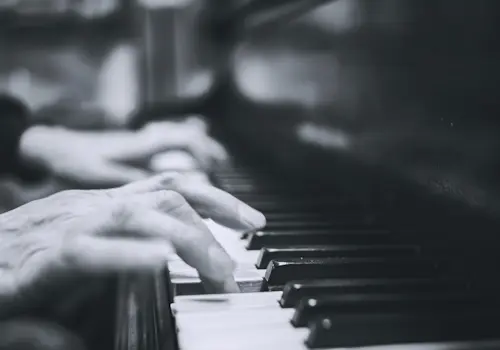
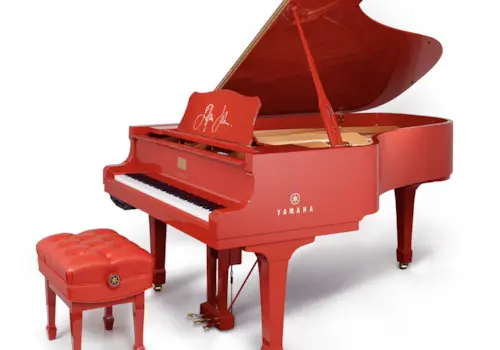
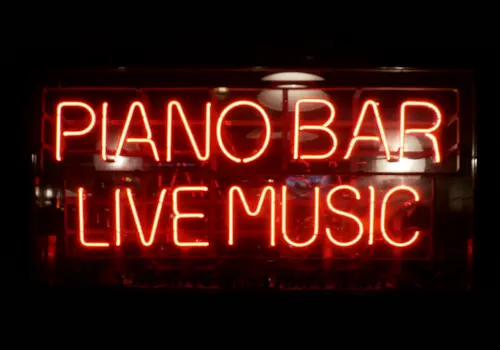
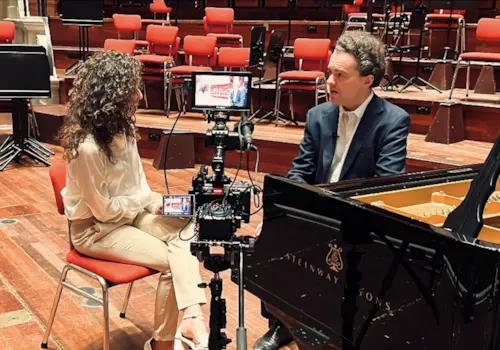
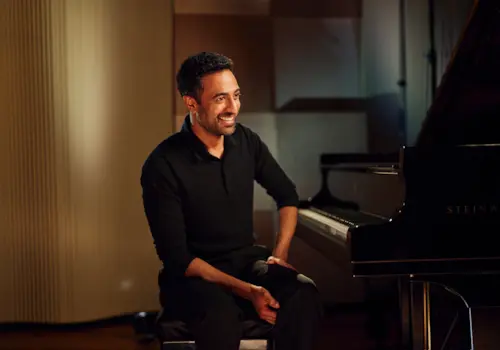
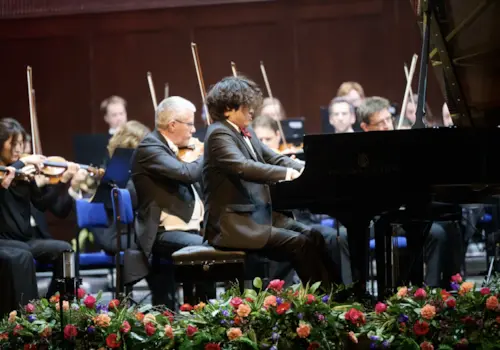

-75157.jpg?&mode=crop&format=webp&webp.quality=75&scale=both)